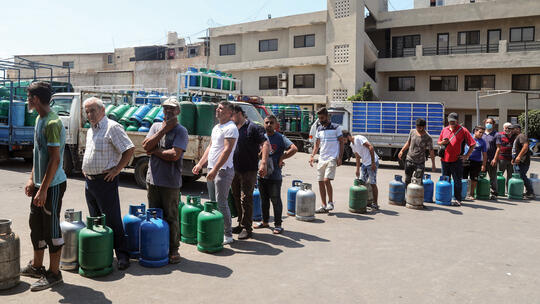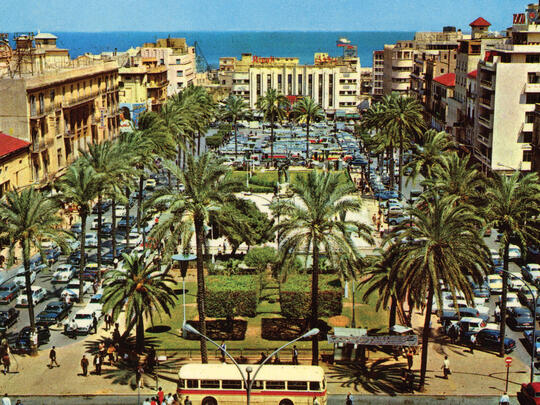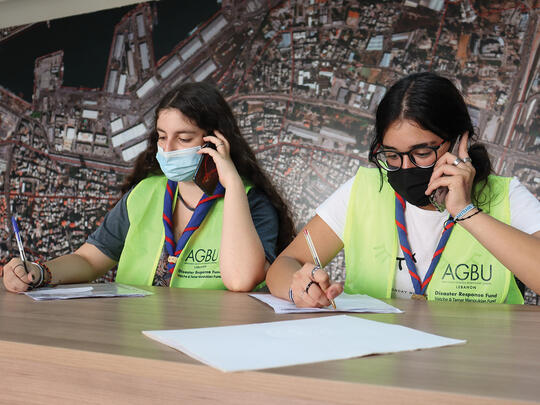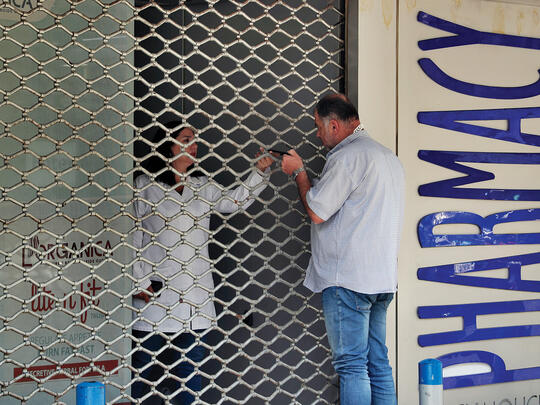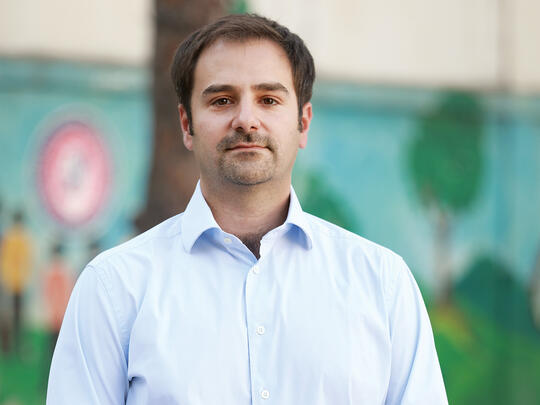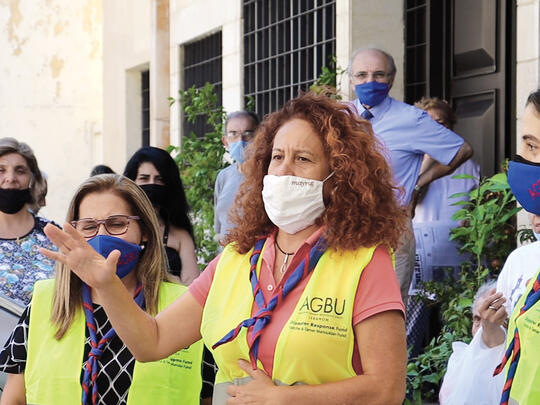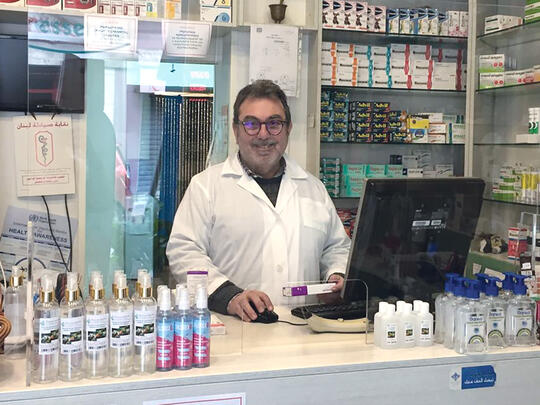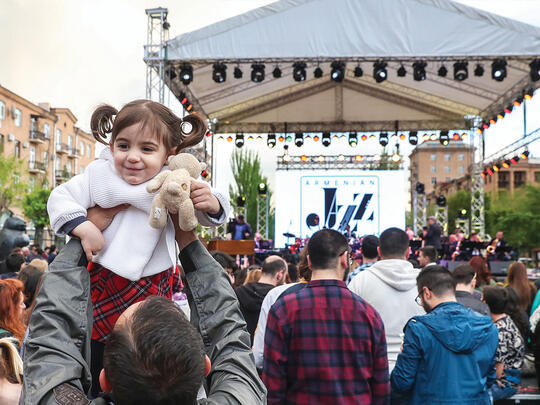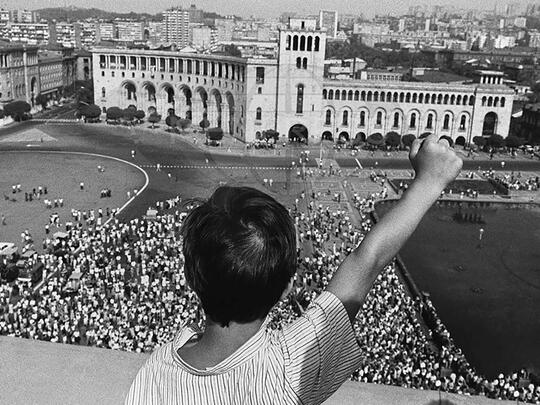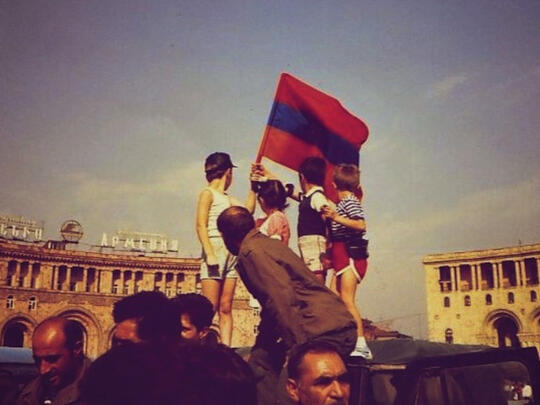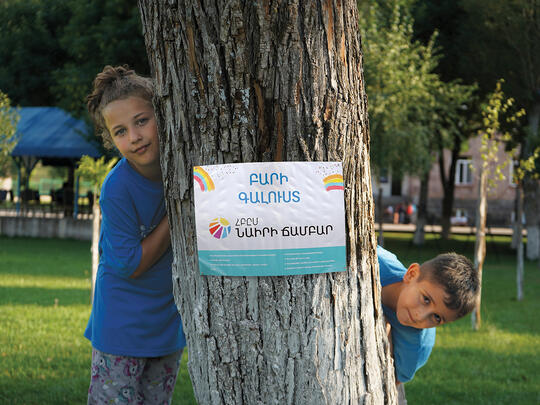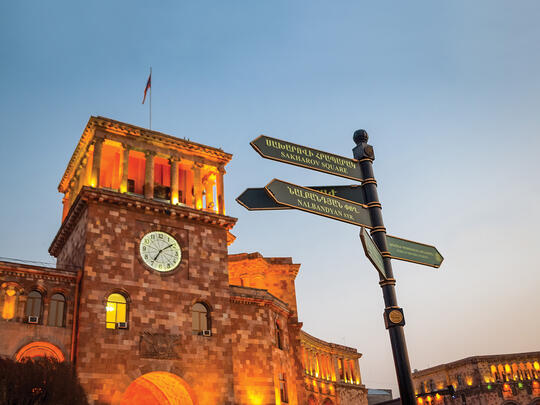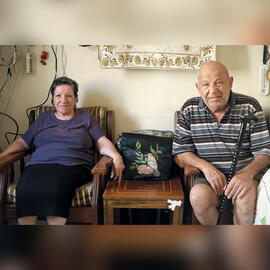
The Retirees
Mihran and Sona Gumuchian
Thousands of Lebanon’s senior citizens have been plunged into extreme poverty in recent months. With their savings rendered worthless and no state pension to fall back on, they are forced to fend for themselves in a country that recently recorded the highest annual inflation rate in the world. According to the United Nations’ International Labor Organization, approximately 80 percent of the country’s over-65 population has no retirement benefits or healthcare coverage.
“We haven’t tasted meat for over a year. We used to enjoy a barbecue once a week, but it’s not possible to do that these days. Even ice cream is a luxury,” says Mihran Gumuchian, a 79-year-old who lives in a dilapidated building in Bourj Hammoud with his wife, Sona, 72. Their one-bedroom apartment is modestly furnished, but the fridge is practically empty.
The couple’s financial situation took a turn for the worse when Mihran was made redundant following the October 2019 revolution. Since then, he has been unable to work—mainly due to issues with his mobility and sight—and has had to rely on donations, such as AGBU’s food box program, for the essentials.
Chronic health conditions, including diabetes, hypertension and rheumatoid arthritis, have only added to Mihran and Sona’s woes, with the high cost of treatment and the scarcity of medication triggering fear and worry. Luckily, the Karagheusian Foundation has stepped in to provide much of the medication the couple needs.
For Sona, the emotional hardship of living through the Beirut explosion and its aftermath has been a tough pill to swallow. “I am scared all the time. The blast damaged my eye, and there was broken glass everywhere. I am not the same person I was before August 4, 2020. I just feel tired and weak all the time,” she says.
Despite the harsh reality of life, with no family around them, the Gumuchians are grateful for what they have. “God watches us from above, protects us and makes sure we have everything we need; we are blessed,” Sona adds.
A few months after AGBU visited the Gumuchians at home, Mihran passed away on November 3, 2021
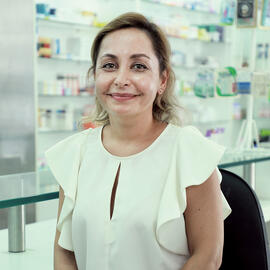
The Business Owner
Rosie Khorozian
Jam-packed medicine cabinets can no longer be found at Cilicia Pharmacy, a family-run business in Mar Mikhael. Instead, the shelves of this once-thriving pharmacy are frighteningly sparse.
“Our store is practically empty,” says Rosie Khorozian, a third-generation pharmacist. “We simply cannot do our jobs properly and fulfill our duties because of the situation. It is deeply frustrating.”
Khorozian explains that countless pharmaceutical products, including life-saving medication used to treat cancer, heart disease and diabetes, have become virtually impossible to find in Lebanon, creating panic among the sick and vulnerable. The few items that are available are quite often unbranded generics that the public is reluctant or skeptical about using.
“Many of our clients are elderly Armenians who live in the area. You can imagine how difficult it is to convince them to switch to generics when they are familiar with a specific brand and have been using that brand from the outset. They trust us, so we do our best to reassure them, but it is a very delicate issue,” she adds.
Besides the psychological impact of Lebanon’s economic meltdown and the trauma caused by the explosion at the port of Beirut, the epicenter of which was less than a kilometer away from the pharmacy, the mental health fallout from Covid-19 has been one blow too many for the Lebanese.
“We are facing a healthcare catastrophe that’s beyond comprehension. The community is fragile, with many suffering from PTSD, anxiety and depression. Our clients know that they can come to this safe space and talk about their problems. We don’t just sell products—we provide hope,” she says.
It is clear that emotions are ruling Khorozian’s decision to stay in Lebanon, as she confesses that no rational mind would choose to remain somewhere that’s becoming progressively worse.

The Professional
Dr. Ohannes Geukjian, Ph.D
“Education is the foundation of a society. When education is hit, like it is in Lebanon, then I’m afraid to say that society is hit,” says Dr. Ohannes Geukjian, assistant professor of comparative politics, conflict resolution and political studies at the American University of Beirut (AUB), his alma mater. Geukjian, who has worked in academia for more than 20 years, completed his Ph.D in the UK in 2005 before returning to Lebanon, his birthplace.
Lebanon’s once-prized education system has been in a state of flux since the October 2019 uprising, as mass anti-government protests forced schools and universities across the country to suspend classes over safety fears, thereby interrupting the academic year. Then, the arrival of Covid-19 at the start of 2020 further complicated matters for Lebanon’s fragile education sector.
“While adapting to online learning was tremendously difficult for teachers and students all over the world, lack of electricity and poor internet connection made things so much harder for those of us in Lebanon,” Geukjian adds.
Yet, it is the devaluation of the Lebanese pound (LBP) that has sent the biggest shockwaves through Lebanon’s education system, which was ranked the tenth best globally in overall quality and fifth in science and mathematics by the World Economic Forum in a 2013 report.
“A large proportion of Armenian students are from middle-income families, so the spike in tuition fees has taken its toll. Some students have left university, while others are taking fewer courses,” he says.
With local salaries plummeting in value, Geukjian admits that the dire situation has left him and his colleagues at a loss about what to do, with hundreds of academics pursuing well-paid opportunities abroad.
“The brain drain in Lebanon is unlike anything we have seen before. Here there is no dignity or optimism—only uncertainty,” he says.

The Community Leader
Arpi Mangassarian
“The sound of craftspeople making shoes, bags, jewelry and other hand-made objects in their workshops used to be common in our neighborhood before the financial crisis,” says Arpi Mangassarian, an architect and urban planner, who, after working at the municipality of Bourj Hammoud for 23 years, went on to found the NGO Badguer, situated in the heart of the well-known commercial hub of Bourj Hammoud in the eastern suburbs of Beirut. But these days, its bustling streets and alleyways are much quieter, as a large number of small businesses have buckled under the pressure of soaring overheads.
With Armenians being the predominant minority in the district, the multipurpose art space and cultural center Badguer was established to promote Armenian artisanship, preserving Armenian culinary heritage and empowering enterprising women. Now, Mangassarian is all too aware of the emotional and financial strain local residents are under, the majority of whom are living on or below the poverty line.
“The ladies who work at Badguer are from the area, and we are one family. I hear their stories and those of their neighbors. I really don’t know how everyone is managing to buy the basics when everything is so expensive. What I do know is that I must be strong for them, support them and do everything I can to protect what we have built together,” she says.
Besides being responsible for keeping the center afloat and safeguarding the salaries of her small team, Mangassarian is also the primary caregiver for her 101-year-old parents, Noubar and Marie.
“I am, of course, constantly worried that my parents might get sick or their medication will run out. However, they taught me optimism and how to maintain hope in the face of adversity. I have faith that, hand in hand, we will overcome these challenges,” she adds.
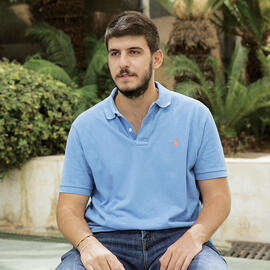
The Young Professional
Serge Kojababian
“I don’t want to move overseas, but it’s what I have to do. I simply cannot make progress in Lebanon,” Serge Kojababian says matter-of-factly. The 25-year-old marketing specialist is preparing to relocate to Jordan with his employer, leaving behind family, friends and the only country he has ever known.
Kojababian is not alone; he is among thousands of bright young professionals seeking to emigrate from Lebanon to the Gulf, Europe, Canada and beyond to escape a country mired in crises so severe that satisfying basic needs has become a daily struggle for its citizens.
“Someone of my age should not be worrying about having electricity or finding gas for their car. Every day I wake up with a million things on my mind, such as whether I will be able to work from home and if the pharmacy will have the medication my parents need. This is not a way to live,” Kojababian says.
With job opportunities becoming scarcer and unemployment rates sky-rocketing to unprecedented levels, fresh graduates are finding it significantly harder to get a foot on the career ladder. For individuals like Kojababian, who are still at the start of their career cycles, the dilemma remains clear—how to develop in a country that has deteriorated to the point where it is unconducive to growth.
“It goes without saying that career advancement is important to me. I feel as though I’m jeopardizing my future and falling behind because of the environment I’m in. There is no other option for now but to leave Lebanon,” he adds.
Photography by George Hanna and Patrick Elias
Banner photo by Bloomberg/Getty Images

